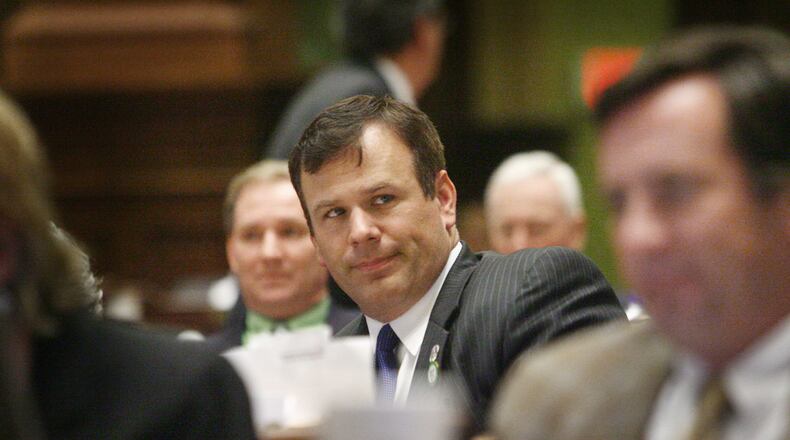James Stephens put his cellphone in his pocket after hanging up with his boss one evening in January 2016.
It took him about 12 minutes to realize that he’d accidentally pocket-dialed his boss, Georgia Subsequent Injury Trust Fund Director Mike Coan, back. By then, he’d had a conversation with his wife, Gina, about, among other things, Coan’s job performance.
Not liking what he heard, Coan told Stephens he could resign or he could be fired when he arrived at work the next day.
In a civil lawsuit filed against Coan, Stephens says his boss violated his privacy by listening to the pocket-dialed conversation.
Coan, who is being represented by state Attorney General Chris Carr, argues that he is immune from Georgia’s eavesdropping law because he was acting as a state employee. The Georgia Subsequent Injury Trust Fund oversees workers’ compensation claims of people with disabilities who further injure themselves on the job.
When contacted, Coan would not comment. Carr’s office didn’t respond to a request for comment.
Stephens’ attorney, David Guldenschuh, said the case could reshape the state’s eavesdropping laws.
“Most people truly don’t realize that you may be committing a felony when you listen in to a private conversation over a pocket-dialed phone call,” he said.
In the complaint filed by Stephens and his wife, Stephens says Coan knew he’d been inadvertently pocket-dialed.
“Rather than simply hang up, (Coan) proceeded to violate Georgia law by intentionally acting in a clandestined manner and listening in to a private conversation between Mr. Stephens and his wife Gina inside the Stephens’ private residence,” according to the complaint.
Coan has asked a Gwinnett County Superior Court judge to dismiss the case, saying he is immune because he was acting within the scope of his official duties “at all relevant times.”
“When Mr. Coan heard statements made by Plaintiff James Stephens criticizing Mr. Coan’s job performance as administrator of the Georgia Subsequent Injury Trust Fund, he did so as an officer or employee of the (fund) acting with the scope of his official duties and employment,” Carr wrote in response to the complaint.
Guldenschuh says that argument doesn’t apply.
“Neither the appearance of the intimidating Attorney General’s Office, nor their filing of multiple pleadings and affidavits, nor Coan’s attempt to hide behind any official immunity of the great state of Georgia, can convert this personal and private criminal act into the strawman the state has tried so hard and eloquently to create herein,” Guldenschuh wrote in response to Coan’s request to dismiss the case.
In his response, Coan said once he realized Stephens called inadvertently, he heard Stephens and his wife discussing Coan and how he performed his job.
“From what Mr. Coan heard Mr. Stephens say during the second phone call, it was evident to Coan that, given Stephens’ opinions and criticisms of Coan and his job performance, Stephens and Coan could no longer have an effective working relationship and Coan could not trust Stephens as a subordinate,” according to Coan’s response.
Civil rights attorney Gerry Weber said he’s not aware of a legal case where someone who was inadvertently called listens in to a conversation. He’s not sure how the state’s eavesdropping law will be applied. If Coan had, for instance, planted a listening or recording device to eavesdrop on Stephens’ conversations, it would be more clear-cut, Weber said.
“Here, it’s an inadvertent pocket dial where it makes the question a little more gray,” he said. “It violates the intent of the eavesdropping statute. It may be determined to violate the letter. It is quite clear that the boss wasn’t party to the conversation.”
Guldenschuh said he knows of only one other case involving a breach of privacy due to a pocket dial. In 2015, the 6th U.S. Circuit Court of Appeals ruled that someone who "butt dials" does not have a reasonable expectation of privacy because they placed the call. The 6th Circuit covers Kentucky, Michigan, Ohio and Tennessee.
Guldenschuh argues in court documents that federal law is much more narrow than Georgia’s eavesdropping statute, which he says would protect the caller against anyone who intentionally attempts to overhear private conversations.
Stay on top of what’s happening in Georgia government and politics at PoliticallyGeorgia.com.
About the Author
Keep Reading
The Latest
Featured




